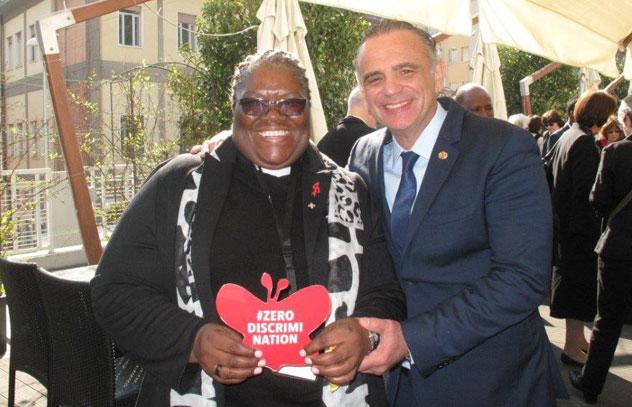Faith-based organizations (FBOs), with the United Nations, have urged expansion of access to anti-retroviral treatment for persons living with HIV and AIDS in a consultation organized by the UNAIDS and Caritas Internationalis, from 25 to 26 February in Rome, Italy.
The consultation brought together more than one hundred participants including representatives from Christian faith traditions, UN organizations, Vatican, governments, donors, the medical and scientific community, and the diplomatic corps accredited to the Holy See.
Among these participants was Dr Sue Parry, Southern Africa’s coordinator for the Ecumenical HIV and AIDS Initiative in Africa (EHAIA), a project of the World Council of Churches.
In her reflections at the consultation, Parry said, “We have reviewed achievements and efforts, shared experiences and strategized on how best to move forward rapidly forward to bring life-preserving medication to so many currently in need, and to so many who will shortly be in need.”
“This treatment initiative is for the benefit – not only of those who are living with HIV – but for all of us, for what affects one, affects all,” she added.
Parry also stressed the need to have emphasis on the “social determinants of HIV, human rights and the equal right to health, especially for those on the margins.”
“The hidden impact of culture, throughout the life-stages of the patients, may undermine our efforts if we fail to acknowledge its power and address this reality.”
“If we do not promote a zero tolerance for all forms of sexual and gender-based violence, we will not win the battle against HIV,” she added.
Dr Luiz Loures, assistant secretary general of the UN and deputy executive director of UNAIDS, said, “We are entering a new phase where we can see the beginning of the end of AIDS”. Currently, faith-based organizations care for more than 50% of people who are living with HIV; therefore, they have the scale and means to move us forward, he added.
Remembering the beginnings of HIV, Loures mentioned alliances formed between patients, families and the churches. The compassionate professional expertise of the churches, particularly the Catholic Church, had a profound influence on people’s lives affected by the pandemic, he said.
Among the challenges highlighted at the consultation was evidence that healthcare is lagging behind in the treatment of HIV-positive children, as well as rising mortality rates in adolescents, keeping people in treatment, and a trend toward overlooking mental health care for HIV-positive adolescents.
Read theological reflections by Dr Sue Parry
UNAIDS article: Roadmap for faith-based organizations to expand access to HIV treatment
Caritas Internationalis article: Drugs, dignity and drive to end AIDS
Ecumenical Advocacy Alliance press release: Drugs and Dignity Key to End AIDS
More information on Ecumenical HIV and AIDS Initiative in Africa






